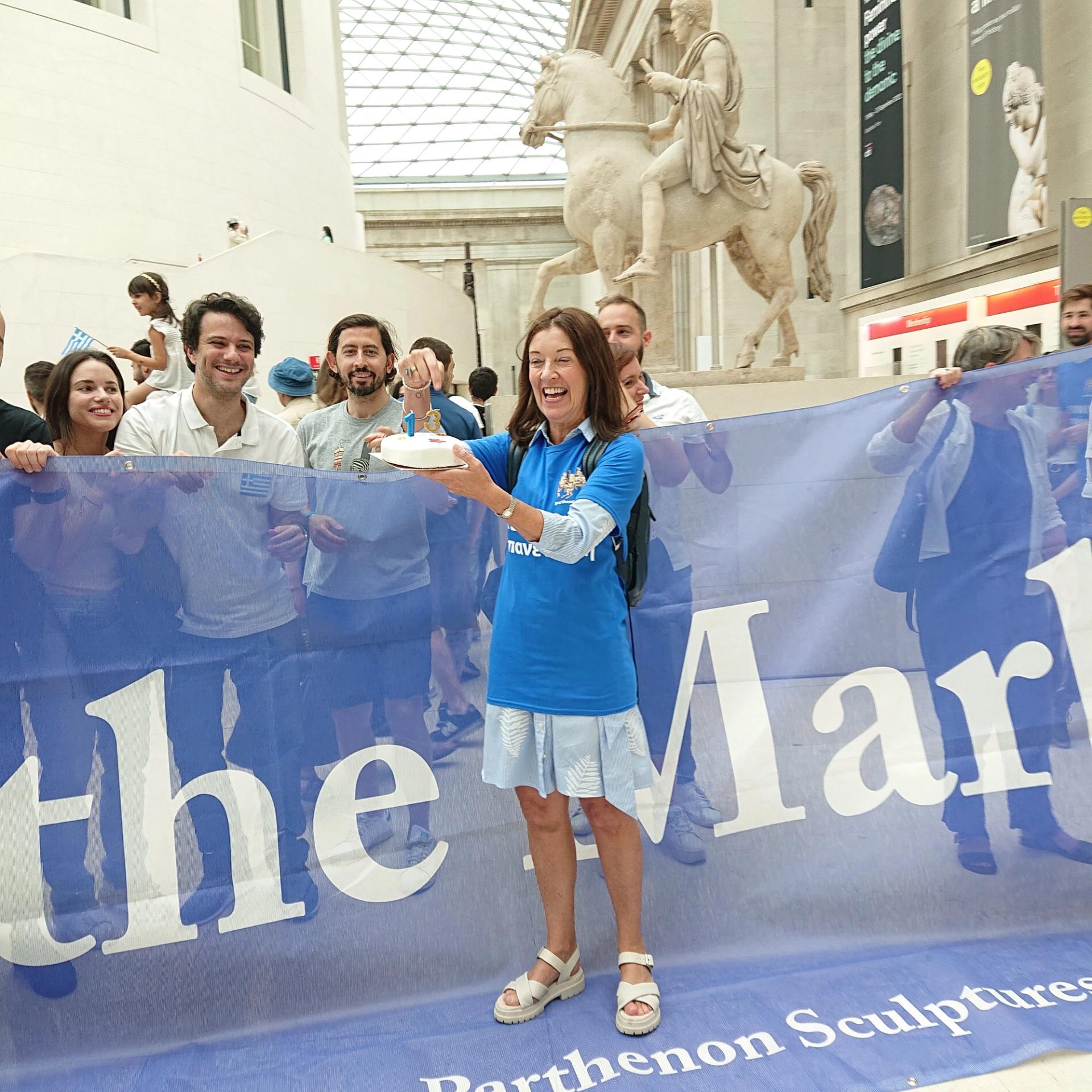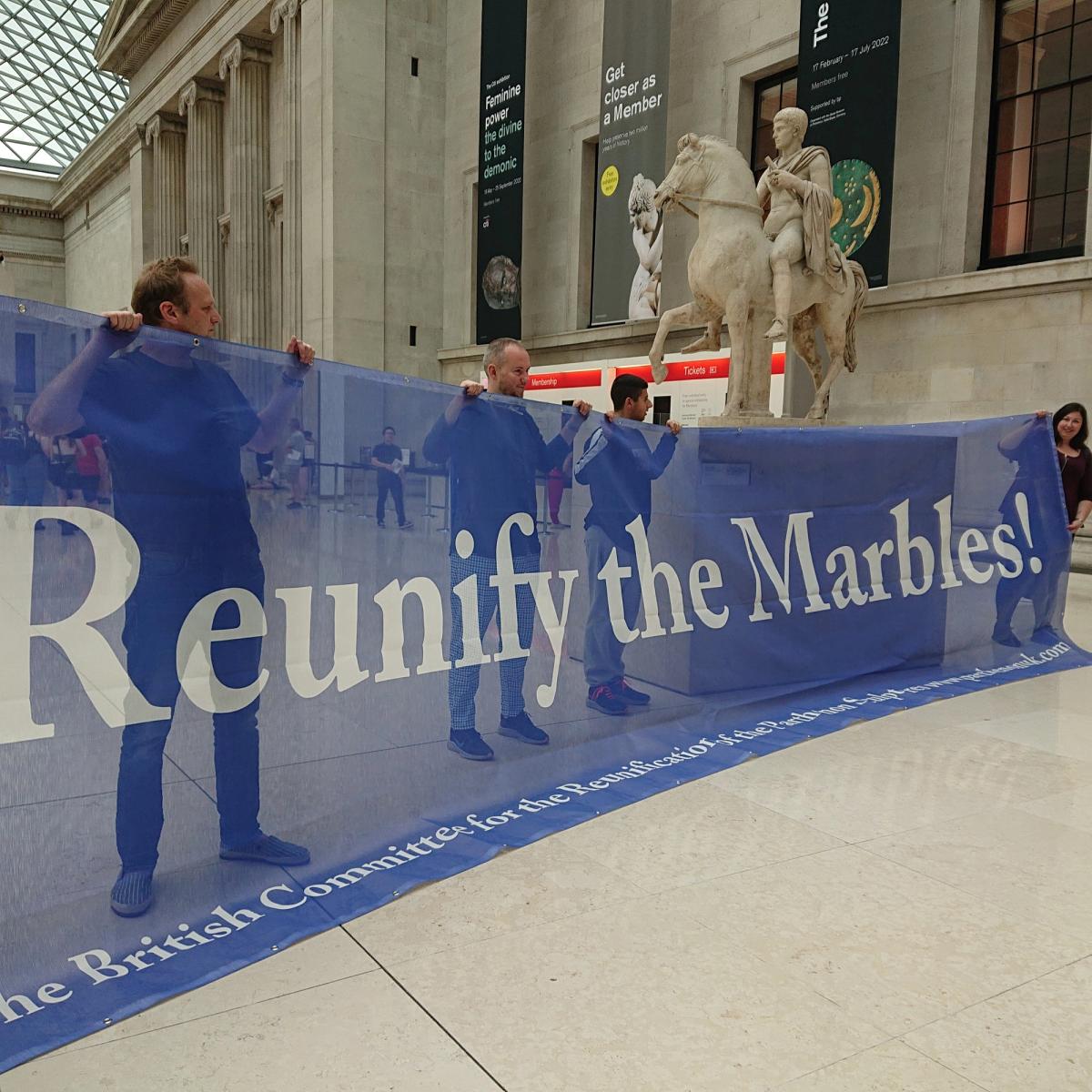The debate about the fate of the Parthenon Marbles shows no sign of abating after Greek community members and classicists from across the UK gathered at the British Museum in London on 18 June to call for the reunification of the ancient works. The protest, organised by the advocacy group known as the British Committee for the Reunification of the Parthenon Marbles (BCRPM), also marked the 13th anniversary of the opening of the Acropolis Museum in Athens.
The protestors unfurled a blue banner saying: “Reunify the Marbles!”. A BCRPM spokesperson adds that the author Victoria Hislop held a cake with numbers 1 & 3 “as those that gathered sang happy birthday to the Acropolis Museum in English and in Greek”. BCRPM members responded to George Osborne’s proposal last week, the chairman of the British Museum, that there is a “deal is to be done where we can tell both stories in Athens and in London if we both approach this without a load of preconditions, without a load of red lines”.

Author Victoria Hislop was also in attendance. Courtesy of BCRPM
Professor Andrew Wallace-Hadrill, former director of research in the Faculty of Classics at the University of Cambridge and BCRPM member, disputed Osborne’s statement that in Athens, unlike London, the Parthenon marbles tell the story “just of Greek civilisation”. Wallace-Hadrill says in a statement: “What other stories do they tell in London? Of the willingness of an imperial power to help itself to the monuments of another civilisation? Perhaps a nobler story could be told in Athens, of the willingness of post-imperial Britain to undo the hybris of the past by restoring one of its greatest glories to Greece?”
An inter-governmental meeting between the UK arts minister Stephen Parkinson and the Greek culture minister Lina Mendoni is still due to go ahead though the Department for Digital, Culture, Media and Sport has so far declined to give the date. The UK government has stated that “while we are always happy to discuss matters of cultural co-operation with our Greek colleagues”, the Parthenon Marbles will not be the subject of the formal talks.
Meanwhile, a growing number of lawmakers and peers in the UK Parliament are calling for the repatriation of the marbles. According to The Guardian, the Labour peer Shami Chakrabarti told the Greek newspaper Ta Nea that “there could not be a better moment [13th anniversary of the Acropolis museum] for the Parthenon marbles to be reunited in their Athenian home.” Chakrabarti is also a BCRPM member.
Another Labour peer, Alf Dubs, also questioned whether restitution of the marbles could lead to calls for other disputed items to be returned to native countries. “We need to explain why returning the marbles would be exceptional and not set a precedent for demands for the return of hundreds of works of art all over the world,” he said.
The British Museum recently said in a statement: “The museum is always willing to consider requests to borrow any objects from the collection… too often discussions are limited to legalistic and adversarial context instead of focusing on how to share the sculptures with a wider world… deepening public access, creating new ways and opportunities for collections to be shared and understood right across the world, remains at the core of what the British Museum seeks to achieve.”
The fifth-century-BC statues have been housed in the British Museum since 1816 after they were removed from the Parthenon temple on the Acropolis in Athens by agents working for the Scottish nobleman Lord Elgin, the then ambassador to the Ottoman court. The sculptures went on display in the British Museum in 1817.


